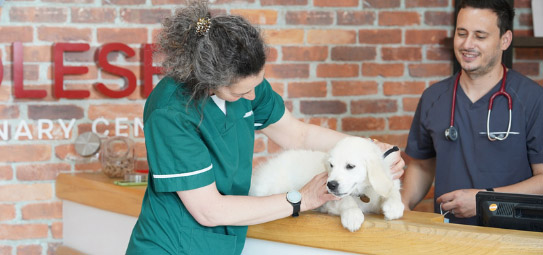
Winter Safety: Protect Pets from Antifreeze Poisoning in Surrey
December 17, 2024
Antifreeze poisoning poses a serious threat to cats and dogs during the colder months. As many people in Surrey rely on this product to protect their vehicles in winter, our veterinary team at Molesey Vets are raising awareness of just how dangerous it can be for our furry friends.
Call us if you suspect antifreeze poisoning on 0208 979 1384.
Why is antifreeze dangerous to cats and dogs?
Our veterinary team at Molesey Vets explain that this common car product, containing ethylene glycol, can be fatal even in small amounts. Ingesting antifreeze causes severe kidney damage in pets, often leading to life-threatening complications. Cats are especially vulnerable, with untreated cases almost always fatal. Dogs also face high risks if not treated quickly.
Why would a pet consume antifreeze? Whether the source comes from a container on a reachable shelf, or a spillage on the floor, dogs can be attracted to the sweet taste and smell of antifreeze. While cats cannot taste sweetness, they may still investigate a spilled liquid if they are looking for a drink.
Signs of antifreeze poisoning in pets
Our vets advise pet owners in Surrey to be vigilant for symptoms such as:
- Vomiting
- Excessive thirst and urination
- Lack of coordination
- Seizures
If your pet shows these signs, contact Molesey Vets immediately for emergency advice by calling 0208 979 1384.
How to prevent antifreeze poisoning
- Store Safely: Keep antifreeze containers in secure, pet-proof locations.
- Clean Spills Immediately: Even a small amount can be deadly if ingested.
- Repair Car Leaks Quickly: Check for and address any radiator leaks.
- Choose Safer Options: Look for antifreeze products containing propylene glycol, which is less toxic.
Our vets in East Molesey advise that by taking these precautions, you can protect your furry friends and give yourself peace of mind when storing antifreeze in your home and using it in your car this winter.
Contact us if you suspect antifreeze poisoning



